Shropshire baby deaths: 'This review is our babies' legacy'
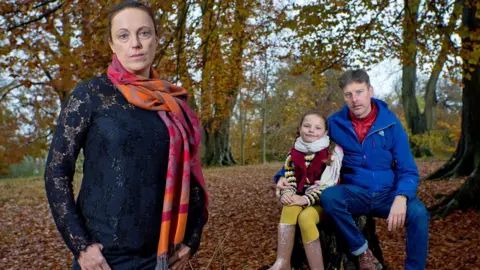 Richard Stanton
Richard StantonMore than 800 families have now come forward to speak to an inquiry into mother and baby deaths at a hospital trust.
A leaked report has revealed a catalogue of errors at Shrewsbury and Telford Hospital Trust was to blame for babies dying needlessly and others being left severely brain damaged. One expert believes the decades-long scandal could be just the "tip of the iceberg".
Five mothers affected by the trust's failings share their stories.
Warning: This article contains upsetting content.
'She knows it makes Mummy sad'
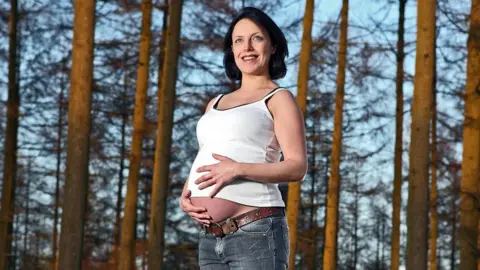 Richard Stanton
Richard StantonWhen Rhiannon Davies became pregnant with her first daughter Kate, she and husband Richard Stanton were "elated".
"When Richard and I got together, I think it is quite unusual for a guy, but we agreed we wanted children and I became pregnant very easily," she said. "We were so excited, you're just in this bubble of happiness.
"I'm very close to my mum and she was elated when I told her and showed her the picture of the 12-week scan. Even my dad, who is a tough old farmer, had tears in his eyes. It was absolutely lovely."
The happiness wasn't to last. Their baby Kate died hours after her birth in March 2009, after delays transferring her from Ludlow Community Hospital, in Shropshire, to a doctor-led maternity unit.
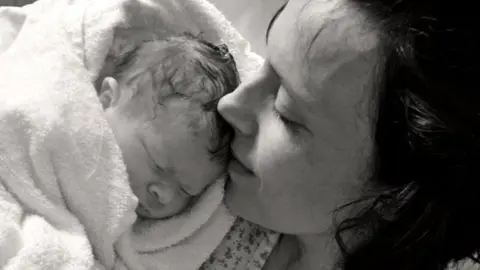 Richard Stanton
Richard StantonThe couple were among those who first pushed for the independent inquiry into maternity care at Shrewsbury and Telford Hospitals NHS Trust (SaTH). Several investigations have already been held into the care Kate and Ms Davies received from the trust.
The couple, who now live in Hereford, have gone on to have another daughter, Isabella, now seven, who Ms Davies described as "the light of my life".
"Kate is always part of her life, her picture is up, and Isabella has grown up knowing she had a sister," Ms Davies said. "She writes her notes every now and again, sometimes she gets upset, she wishes she had a sister... and she knows it makes Mummy sad."
Ms Davies said they were campaigning to prevent other babies from suffering in the way Kate did. The couple have worked closely with Kayleigh and Colin Griffiths, whose one-day-old daughter Pippa died from a Group B Streptococcus infection.
Ms Davies said: "This is Kate and Pippa's legacy."
Following the Ockenden Review, the findings of which are due to be published next year, she wants to see corporate manslaughter charges brought against the hospital trust.
"Where there have been avoidable failings over a period of 40 years, contributing to the deaths of hundreds of babies, dozens of mothers, and serious harm to babies, as far as I'm concerned, and my husband agrees, corporate manslaughter is the only way to force change," she said.
Det Supt Carl Moore, of West Mercia Police, said the force was liaising with the independent inquiry and awaiting its findings before any criminal proceedings would be considered - in line with protocol in healthcare settings.
'My baby's injuries were barbaric'
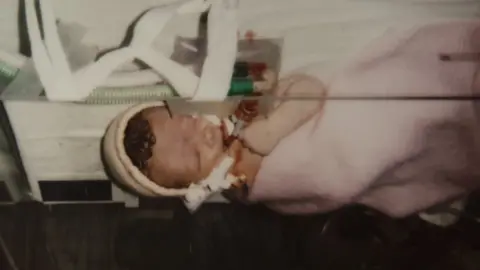 Julie Rowlings
Julie Rowlings"Every year on Olivia's birthday, we go to her grave. I take big bubble wands and we fill the graveyard with bubbles.
"Then we go home, we have sandwiches and cake with a candle on it and the kids blow the candle out. It is these little things we do as a family that give us peace."
Julie Rowlings' first-born daughter Olivia, died hours after she was delivered at Royal Shrewsbury Hospital in May 2002. She had suffered multiple head injuries during her birth.
Doctors had decided to induce her first child a week early so they could treat Mrs Rowlings' back complaint. But while she was being delivered with forceps and a suction device, Olivia suffered multiple skull fractures, as well as cuts, bruising and swelling to her face.
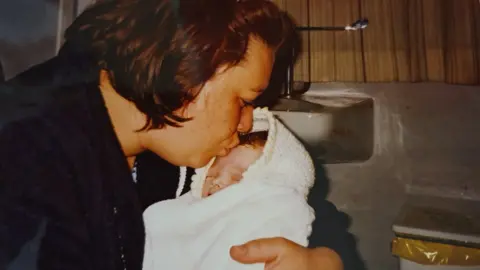 Julie Rowlings
Julie Rowlings"The injuries she received while they were trying to deliver her, in that day and age were barbaric; no child should ever be born with those kind of injuries," Mrs Rowlings said. The doctor who delivered her faced charges of manslaughter by gross negligence, although he was later cleared by a jury.
Mrs Rowlings said: "Olivia didn't die of natural causes, there weren't complications that meant she was going to die, the complications she had were due to the injuries she received while trying to deliver her.
"For me, one of reasons I came forward was to ensure my daughter, when it is her turn, her maternity is going to be safe. I was a lone voice in the wind - I am not a lone voice any more; they have to listen, there has to be a change."
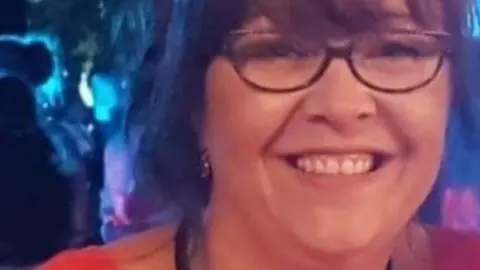 Julie Rowlings
Julie RowlingsMrs Rowlings, and her husband Neil, who still live in Telford, have since had three children William, 16, Matthew, 12 and Julie, 11. They were all born at New Cross Hospital in Wolverhampton as Mrs Rowlings said she could not bring herself to go back to Shrewsbury.
"We weren't trying for William, he was a surprise, but he was meant to come, he gave me the strength to keep going," she said. "I am very protective of the three of them, fiercely so. I want justice. Not just for my daughter, for all of these children, all of them - they deserve it.
"I can only go on how I feel, but to know that there are people around like me, who are feeling how I'm feeling... you don't just feel like that for a little while, it is something you carry for the rest of your life; that heartache, it is always there."
'I was always scared of childbirth, now I know why'
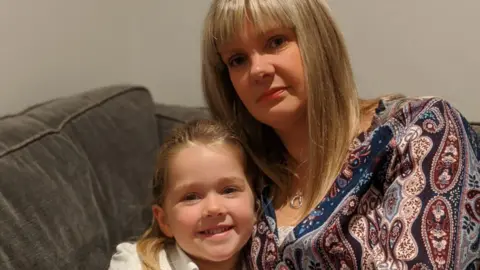 Andrea Bates
Andrea Bates"It should have been the happiest time of our life," Andrea Bates said of the birth of her daughter, Eva, but instead it became an ordeal.
Eva was born healthy in February 2015, but nearly five years on Ms Bates is still suffering from the consequences of her birth.
"I don't think I'll ever be fixed," she said. "It's just left me in a mess, really."
After a long labour, doctors at SaTH used forceps to pull Eva out with what Ms Bates's husband, Matt, described as "brute force". A high dose of anaesthetic meant Ms Bates was so numb when Eva was born that she couldn't feel her when she was laid on her chest.
For the first nine months of Eva's life, she was left in excruciating pain due to an open wound which, despite repeated promises it would heal given time, instead became infected. The problems didn't end there - the injuries Ms Bates suffered during the birth of her only daughter included a prolapsed bowel, leaving her with incontinence problems.
"Eva asks, 'Mummy are you coming on the trampoline? but I can't - I can't exercise," she said, adding that it takes a lot of courage and preparation even to leave the house. She feels guilty that Eva doesn't have a brother or sister, but the thought of going through childbirth again leaves Ms Bates "terrified".
Without her daughter, Ms Bates said she does not know if she would have carried on. Her life has changed hugely: she had to give up her dream job as an airline cabin crew member, she still lives in pain and takes antidepressants.
"It's affected everything," she said, although she added she was keenly aware there were "so many families who have had it worse".
'My son needs justice, I need closure'
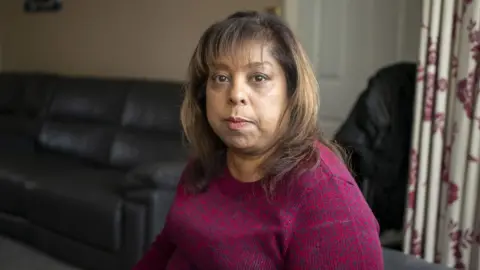 Shoosmiths
Shoosmiths"I did a proper funeral for my son - it was the worst time of my life," Kamaljit Uppal said. Her third child, Manpreet, was born on 17 April 2003 at the Royal Shrewsbury Hospital. Two and a half hours later, he was pronounced dead.
"I never saw him alive," she said.
Ms Uppal's pregnancy was complex - her unborn son was breech and it was recommended by antenatal staff that she would need a Caesarean delivery. However, when she arrived at hospital, this was ignored.
"My waters broke, my baby's feet fell out, the doctor wasn't even in the room," she said. "It went as far as the bum and then the baby got trapped." It was only at this point that Ms Uppal had an emergency C-section, with her notes graphically revealing that "one doctor pulled and one pushed" to deliver Manpreet.
He was born "floppy" and while he was worked on by medical staff, Ms Uppal was moved to a ward with other mothers and their newborns. She could hear babies crying when her son's body was brought to her for her "to say goodbye".
Until 2018, she did not know she was not alone. Seeing reports of other bereaved families who had depended on SaTH for their care and been let down made her legs "turn to jelly," she said.
"I have flashbacks, I can't sleep at night," she said. "It was so painful and now it's all coming back."
She's now seeking justice for her son, and answers for herself. "I need closure, I keep wondering what happened," she said. "Something needs to change, someone needs to be punished.
"They took my little precious baby away because they made the wrong decision."
'The difference between them is vast'
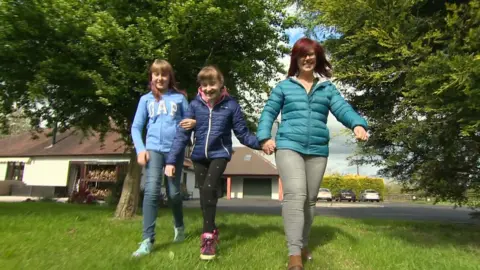
"Some days I could walk out the door and not come back."
For 14 years, Sharon Morris has cared for her daughter, Olivia, who lives with cerebral palsy due to problems with her birth and needs round-the-clock support. She was born at Royal Shrewsbury Hospital in 2005, 40 minutes after her identical twin sister, Beth.
This delay, or "faffing around" as Ms Morris calls it, combined with a failure to spot she was in distress due to an error in properly monitoring her heart rate, meant Olivia suffered a brain injury. At 14, she cannot talk, is tube fed, and has learning and behavioural difficulties.
Seeing her twin sister do all the things she can't is "frustrating for Liv," her mother said. "The difference between them is vast. Beth's got a big group of friends, Olivia's got no friends."
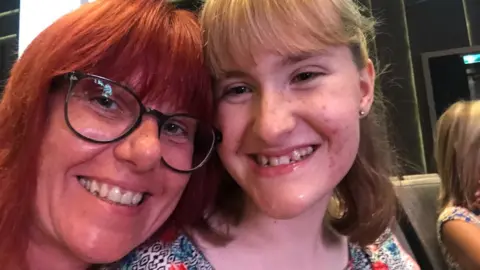 Sharon Morris
Sharon MorrisOlivia's frustration, combined with teenage hormones, means she can be aggressive. "It's not who she would be if this hadn't happened," Ms Morris said.
The impact of the hospital's failings - for which the trust accepted liability - is felt throughout the family. Ms Morris feels like she doesn't give Beth "as much time as she deserves" and the strain has also led to tensions in her marriage.
"These problems will remain with [Olivia] for the rest of her life, but also with the rest of ours," Ms Morris said.
Five carers provide 24-hour support for Olivia - they've never had a family holiday, or even a trip to the girls' grandparents' homes without carer support, and the family regularly returns to the hospital that "ruined" Olivia's life for further treatment.
"Nothing could ever prepare you for everything you face when you have a disabled child," Ms Morris said.
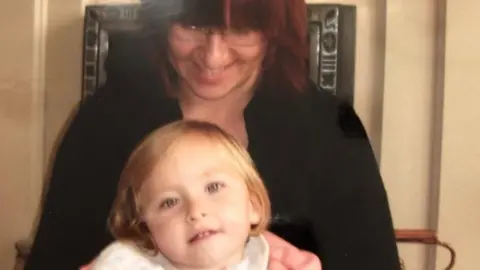 Sharon Morris
Sharon MorrisShe hopes the review leads to action - so far, she feels the response from the trust has been "just words". "Fourteen years and it's still the same," she said. "People need to be held to account.
"Any expectant mothers out there, how must they be feeling?"
If you have been affected by the issues raised in this article, help and support can be found at BBC Action Line.

Follow BBC West Midlands on Facebook, on Twitter, and sign up for local news updates direct to your phone.
